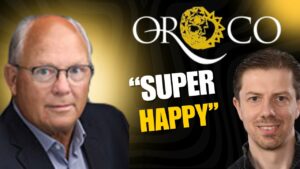Minaurum Gold Inc. (“Minaurum”) is pleased to announce the beginning of a minimum 2,500-metre diamond-drilling program on its 5,800-ha Corazonada silver-zinc skarn project in Morelos State, Mexico. The Corazonada project is an intrusion-centered skarn system hosted by carbonate rocks identical to those of the numerous gold deposits of the 15 Moz Guerrero Gold Belt as well as Esperanza Resources’s nearby 1 Moz Cerro Jumil Gold deposit. Drilling at Corazonada will both test a prominent aeromagnetic anomaly in the southwest portion of the project and follow up on strong silver and zinc values from surface rock-chip sampling.
The surface exposure of the Corazonada skarn system flanks a north-northwest-trending ridge of altered intrusive and carbonate rocks about 8.5 km long and up to 3.5 km wide. Garnet and pyroxene skarn affects both the carbonate and intrusive rocks, and has associated zinc, lead, and silver mineralization. Surface rock chip assays have returned up to 698 g/t Ag, 2.7% Zn and 1.9% Pb. Project infrastructure is excellent with good road access and electricity.
Zinifex USA Ltd conducted an exploration program at Corazonada from 2007 to 2008 consisting of geologic mapping, surface sampling, a helicopter-borne magnetic survey, and a 2000-metre core drilling program. After Zinifex was merged with Oxiana Minerals to form OZ Minerals, OZ dropped the project without drill testing the strongest magnetic anomalies.
“Corazonada is a large system with similar size potential to that of the major gold skarns of the Guerrero Gold Belt,” remarked Darrell Rader, President and CEO of Minaurum. “Cerro Jumil began as a silver-zinc skarn prospect, but important gold values were intersected in drilling in the West Zone, and later in surface exploration and drilling in the southwest extension area. We believe that the large and prominent magnetic anomaly we are targeting represents a deeper part of the Corazonada skarn system that, in addition to silver-zinc mineralization, may encounter gold-dominant mineralization. ”
Minaurum is also pleased to announce the launch of its new website with informational videos on the 15 million-ounce Guerrero Gold Belt, Mexico. The web address remains www.minaurum.com. The website has a new, user-friendly interface providing visitors a clearer understanding of Minaurum’s exploration portfolio in Mexico.
The informational videos on the Guerrero Gold Belt are presented by gold-skarn expert David M. Jones, a Director & Senior Geologist for Minaurum Gold. Mr. Jones’ exploration model was pivotal in the discovery of a number of gold deposits in the Guerrero Gold Belt including Goldcorp’s 8 million-ounce Los Filos deposit.
Minaurum Gold is an aggressive exploration company focusing on gold- and silver-dominant projects in Mexico that have district-scale exploration potential. Including the recently completed drill program at Capilla and the present Corazonada project, four of Minaurum’s projects will have been tested by more than 10,000 meters of drilling by mid 2012. Drilling is currently underway on the Adelita copper-gold project in Sonora.
Qualified Person: Mr. Stephen R Maynard, M.S., C.P.G., has acted as the qualified person as defined in National Instrument 43-101 for this disclosure and supervised the preparation of the technical information in this release.
ON BEHALF OF THE BOARD
“Darrell A. Rader”
Darrell A. Rader
President and CEO
For more information, please contact:
Sunny Pannu — Investor Relations Manager
(778) 330 0994 or via email at info@minaurum.com
1500 – 409 Granville St.
Vancouver, BC V6C 1T2
Telephone 778 330-0994
www.minaurum.com
info@minaurum.com
Quality Assurance/Quality Control: Preparation and assaying of drilling samples from Minaurum’s projects are done with strict adherence to a Quality Assurance/Quality Control (QA/QC) protocol. Core samples are sawed in half and then bagged in a secure facility near the site, and then shipped by a licensed courier to ALS Minerals’ preparation facility in Guadalajara, Jalisco, Mexico. Pulps of the samples are prepared in Guadalajara, from where they are shipped to Vancouver for chemical analysis by ALS Minerals. Samples are analyzed for gold and silver by fire assay and ICP/AES on a 50-gram charge. In addition, analyses are done for a 51-element suite using aqua regia digestion and ICP analysis.
Quality-control (QC) samples are inserted in the sample stream every 20 samples, and thus represent 5% of the total samples. QC samples include standards, blanks, and duplicate samples. Standards are pulps that have been prepared by a third-party laboratory; they have gold values that are established by an extensive analytical process in which several commercial labs (including ALS Minerals) participate. Standards test the calibration of the analytical equipment. Blanks are rock material known from prior sampling to contain less than background values of gold and silver; they test the sample preparation procedure for cross-sample contamination. In the case of duplicates, the sample interval is cut in half, and then quartered. The first quarter is the original sample, the second becomes the duplicate. Duplicate samples provide a test of the reproducibility of assays in the same drilled interval.
When final assays are received, QC sample results are inspected for deviation from accepted values.
Forward Looking Statement: Some of the statements contained in this press release are forward-looking statements. Forward-looking statements are not historical facts and are subject to a number of risks and uncertainties beyond the Company’s control, including, but not exclusively, statements regarding potential mineralization, exploration results, completion of work program and studies, and future plans and objectives of the Company. Resource exploration, development and operations are highly speculative, characterized by a number of significant risks, which even a combination of careful evaluation, experience and knowledge may not eliminate, including, among other things, unprofitable efforts resulting not only from the failure to discover mineral resources but from finding mineral deposits which, though present, are insufficient in quantity and quality to return a profit from production.

















